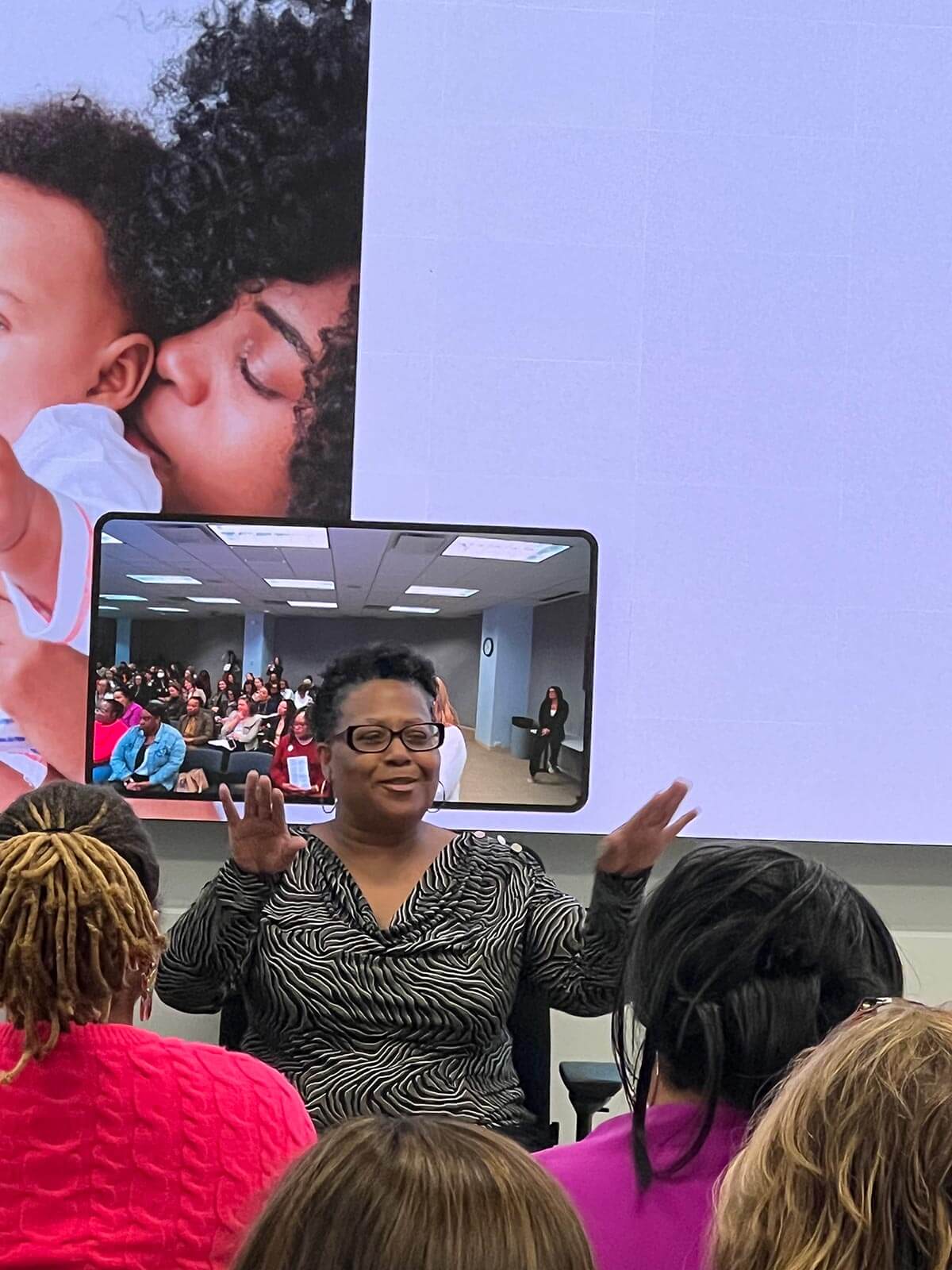‘Doula Godmother’ Makes Strides in Black Maternal Health
Feb 21, 2024
In celebration of Black History Month, we honor the tenacious advocacy of Cynthia Hayes.
Early in her career as a doula, Cynthia Hayes recalls caring for a wealthy white mother-to-be who endured a traumatic labor due to a lack of empathy and questionable care at a well-known hospital.
The experience got Hayes thinking that if a woman of means and privilege faced such challenges, then what were the experiences of Black mothers.
Her curiosity led her to Ask Jeeves, the early 2000s internet web browser.
“That’s how long ago this was,” Hayes joked.
Jeeves ended up raising more questions in Hayes’ mind than providing answers. It wasn’t until she tuned to the 2004 PBS documentary, A Doula Story, that she started to gain greater insight into the stark challenges and deplorable disparities associated with Black maternal health — and the essential role doulas could play in helping to address those challenges.
“They were talking about community doula programs, and I considered whether I’d seen a doula that looked like me. I had only seen two Black doulas before,” she recalled. “I was like, what? I can even remember the lighting on that day. I literally stood over the TV transfixed.”
Hayes wept at that moment.
I asked myself, ‘How is it, as much as I was raised to be an advocate, how did I not even think about the community I came from?’”
As we celebrate Black History Month, Hayes deserves recognition for her relentless advocacy and commitment to pushing for legislation supportive of doulas and the essential work they do. Most recently, she has served a key role in Fairfield County’s Community Foundation’s Black Maternal Health Initiative, which aims to aggressively address the significant health disparities faced by Black mothers and their babies.
Building Connections – and a Coalition
At the start of her journey as a doula, Hayes was convinced there were far too many c-sections occurring and not enough education and guidance regarding the importance of breastfeeding.
For her part, she was determined to breastfeed. But out of the cadre of mothers in her friend and family group, only one breastfed her baby. And as a mother of three who also had experienced a stillbirth, Hayes knew there had to be better ways to experience birthing as a joy – and not a medical condition as so many in the medical establishment viewed it.
“I started trying to figure out how I could connect and help others recognize that there is a great amount of work that needs to be done overall … paying attention to what’s happening in the Black community.”
Ultimately, that led her to team up with SciHonor Devotion, the executive director of Earth’s Natural Touch: Birth Care and Beyond, to become founding members of Doulas4CT, a coalition focused on advocating for Black doulas who seek professional support while also empowering those giving birth to take charge of how they want to bring life into the world.
Hayes now serves as project director of the coalition’s first funded program. Additional founding members include national, grassroots and local organizations such as Planned Parenthood, Health Equity Solutions, Bridgeport Prospers and March of Dimes.
Fellow certified doula, Tracy Caldwell, has seen Hayes in action and describes her as “a true advocate.”
“When doing advocacy work, you have to think about everyone – you have to be courageous to take on a whole system. It’s not like a mom-and-pop store. When you’re going to take over big systems, by design, it takes courage. It also takes a bit of charisma and sweetness, and Cynthia has that. It disarms people enough to get them to sit with you at the table.”
Tracy Caldwell
certified doula
‘Rebellious Work’
A breakthrough for the coalition came in late winter of 2018, when a first piece of legislation was introduced by state senator Marilyn Moore (D-Bridgeport). While Hayes and fellow advocates were encouraged to see support for doulas, they wanted to ensure the legislature’s support was sound and truly met the needs of the entire doula community.
“We were lucky there were power players almost as concerned as we were about Black maternity challenges,” said Hayes, who is also a member of Earth’s Natural Touch: Birth Care and Beyond that works to reduce the risk of undesirable pregnancy and birth outcomes and eliminate racial and ethnic disparities in infant and maternal health. “They wanted this work to be informed by Black doulas. There wasn’t a lot of education or information about the work, so we had concerns about that. What we didn’t want to happen was to have a whole certification process that would eliminate and further disenfranchise Black doulas in this space.”
During the 2019 legislative session, the Coalition provided testimony and wrote letters, but ultimately decided to let the bill die in an effort to get out more information to the community. Their areas of focus included providing doula-tailored classes on birth equity and birth justice, community doula work, and working with nonbinary people who give birth.

Then came the pandemic, causing further delays.
“It wasn’t until 2021, until we got the definition of doulas in statute,” Hayes said. “That whole time, we had been meeting and getting to know legislators and finding out who our champions would be. That was the first step. It took a while.”
After much patience and work, in July 2023, Connecticut Gov. Ned Lamont signed An Act Protecting Maternal Health, which established new laws governing certification and practice of doulas in support of childbirth services. The act called for the creation of a Doula Advisory Committee to develop standards and recommendations for doula certification and training.
Maya El-Sayyid is one of the many trained and certified doulas and birth workers who have admired Hayes’ persistence – and her knack for enlisting allies to change hearts and minds of naysayers.
“You have this team of people fighting against you, people who don’t want to see our Black women and babies survive,” El-Sayyid said. “She questions, is healthcare really what we need it to be, are we getting the proper care for Black women and Black babies, and she’s making it happen.
“I put her next to the amazing Black midwives from down South, where it was illegal to practice midwifery in some states, and yet they were hiding it, trying to make it happen, taking care of each other, taking care of the slave masters’ wives. I put her next to those who are doing this rebellious work.”
Expanding Impact
Since then, the Department of Public Health has created the Doula Advisory Board. Hayes helped lead talks about the certification process and what it takes for hospitals to recognize trained doulas to empower Black families and Black doulas.
“She’s been the doula godmother,” Caldwell said. “She’s been phenomenal. She guides us into how we should do our testimonies for legislative work. We’ve gone to different events, and she’s spearheaded the connections.”
Under Hayes’ leadership, Doulas4CT is expanding its advocacy and participation in policy discussions about the doula workforce and the services they provide with the help of grants.
Doulas4CT is also working on ensuring doulas can be recognized under more than just one certifying arm. Currently, Doulas of North America (DONA), is the only accepted doula certification program, but Cynthia says its training doesn’t include culturally competent courses to better work with disenfranchised communities. There is also a coalition effort to incorporate doulas into Medicaid payments for maternity care.
“Sometimes it seems these goals are very lofty, and I wonder how they become tangible,” Hayes said. “We have to make sure there are enough Black doulas being trained so that there is greater access.”
No doubt, Hayes will be leading the charge, no matter how lofty – or daunting – the goal.
*The certified doulas featured in this article are credentialed in the following areas: eCID (certified interdisciplinary doula), CLC (certified Lactation Counselor); eCDAO (Certified Doula with Associations and Organizations).

